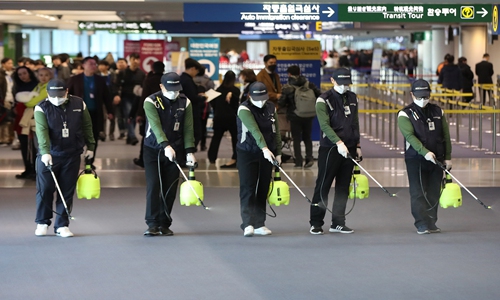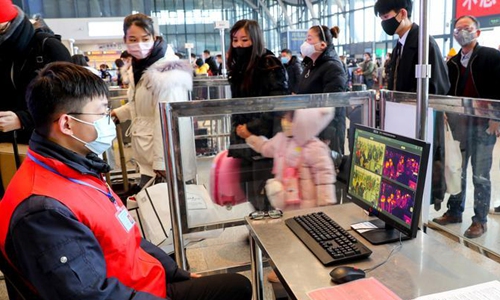HOME >> CHINA,SPECIAL-COVERAGE
Coronavirus battle at full-scale
By Zhang Han and Chen Qingqing Source:Global Times Published: 2020/1/21 23:28:40 Last Updated: 2020/1/21 23:45:50
Strictest control measures deployed in China to curb spread of pneumonia

Sanitation workers spray disinfectant at the customs, immigration and quarantine area of Incheon international airport, west Seoul, on Tuesday. South Korea on Tuesday confirmed its first case of the new coronavirus that is spreading in China, as concerns mount about a wider outbreak. Photo: AFP
Human-to-human transmission of the new coronavirus was confirmed Tuesday as the death toll rose to six in Chinese mainland and the nation's health authorities stepped up efforts ahead of the Spring Festival travel rush, the world's largest scale human migration.A total 309 cases were confirmed nationwide, 270 in Central China's Hubei Province, where the coronavirus originated, five in Beijing and 14 in South China's Guangdong Province, as of Tuesday evening, People's Daily reported.
Fifteen medical workers in Wuhan were among those infected.
As of 7 pm Tuesday, Shanghai added four more confirmed cases, bringing the city total to six, with three suspected cases. Tianjin confirmed two cases.
New confirmed cases were also announced in Central China's Henan Province and Northwest China's Ningxia Hui Autonomous Region. The infected were believed to have come from Wuhan.
The total confirmed cases across the nation had yet to be released as of press time.
There were 117 suspected cases discovered in Hong Kong as of Tuesday noon, with one sufferer in an extremely critical condition, Chinese national broadcaster China Central Television (CCTV) reported on Tuesday evening.
Diagnosed cases have been also reported in Thailand, Japan and South Korea.
The coronavirus was confirmed to be transmitted person-to-person as new infected people who haven't traveled to Wuhan were found to have close contacts with earlier patients. The disease was first detected in a seafood market in Wuhan.
At the invitation of World Health Organization, China and other pneumonia-affected countries will take part in an emergency meeting on international health regulations on Wednesday night and share information with representatives from other countries, Geng Shuang, spokesperson of the Ministry of Foreign Affairs, told a press briefing on Tuesday.
China will further study the virus with relevant organizations, strengthening global collaboration in fighting the spread of the virus and safeguarding public health safety, Geng noted.
Although classified a "class B infectious disease," the coronavirus would be handled like a "class A epidemic" the commission said, meaning the prevention, reporting and quarantine work will meet the strictest levels.
Cholera is among diseases classified as class A.
Class A measures require governments at all levels to quarantine, treat and make timely reports of discovered cases. Police can intervene when a patient refuses treatment. The government can install checkpoints at junctions and public places to detect disease.
The B-A approach was also applied to severe acute respiratory syndrome (SARS) which caused 774 deaths worldwide in 2002-2003.
Class A measures are the strictest on the Chinese mainland, Zhou Zijun, a professor at the Peking University School of Public Health, told the Global Times Tuesday.
"The decision was made considering the infectivity of the coronavirus," Zhou said, "but the fatalities and damage to human bodies are less serious than the plague or cholera. Therefore it is listed as B class disease."
Virus updates are more transparent and timely than during SARS, but there is "still space for improvement," according to Yang Zhanqiu, deputy director of the pathogen biology department at Wuhan University.
The country has made progress in sharing information and preventing and controlling diseases, Yang said.
The incubation period of the new pneumonia is longer than SARS but the symptoms are lighter, making it difficult to identify patients, he noted.
For a transportation hub like Wuhan, tracking travelers' temperatures at airports and train stations places a high demand on equipment and personnel, Yang said.
City on alert

An employee of Wuhan train station in Central China's Hubei Province observes passengers' body temperature on January 21 amid outbreak of the novel coronavirus pneumonia. Photo: China News Service
In Wuhan, temperature takers are being deployed at junctions to track outbound individuals and outbound tourist groups have also been cancelled.To reduce unnecessary gatherings of people, the city canceled a festival cultural activity on Saturday and is carrying out random checks on vehicles for live poultry or wildlife being moved in or out of the city.
"Railway stations and airports have set up temperature screening spots, while our company building has also been sterilized," a Wuhan resident told the Global Times on Tuesday.
Relevant information was being disclosed in a more timely manner than previous days, said the resident, who did not give his full name.
"People have become more vigilant on the matter. However, there is no palpable panic," he said.
The cost of treating confirmed cases of pneumonia-like symptom diseases beyond medical care coverage would be borne by the government, Wuhan health officials said at a media event on Tuesday evening.
China's National Healthcare Security Administration rolled out a special reimbursement policy to include all drugs and medical services in payment coverage and announced a "treat first pay later" policy to guarantee timely treatment of infected cases.
Virus source
The possible animal carrier of the virus has not been identified but the disease was first detected among people who work at a seafood market that also sells wild birds, civets and snakes.
The coronavirus is highly likely originated from wild animals, said Zhong Nanshan, an epidemiologist and head of a National Health Commission team investigating the virus.
Civets were suspected for transmitting SARS to human beings.
In an article on its WeChat account, the Ministry of Natural Resources on Tuesday warned the public not to eat or have contact with wild animals.
Hunting wild animals for their meat and fur not only threatens the ecology but also puts human beings in danger, said the article.
RELATED ARTICLES:
Posted in: SOCIETY,FOCUS